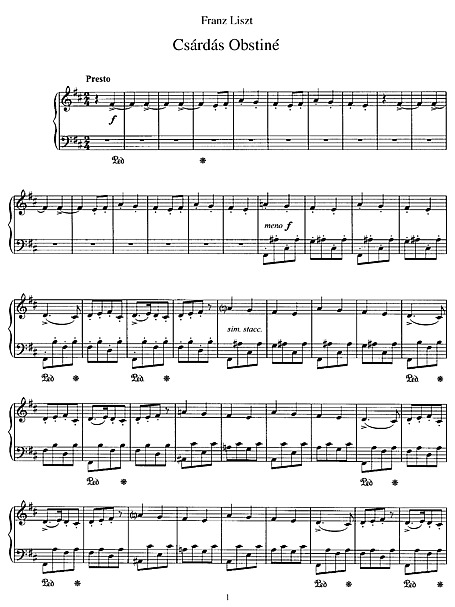Two Czárdás
No. 2 Czárdás obstinée

- Componist
- F Liszt
- Opus
- S 225
- Year composed
- 1884
- Pagina's
- 7
- Instrumenten
- Piano
- Moeilijkheidsgraad
- Grade 8
- Licentie
- Publiek domein
- Geüpload door
- Tony Wilkinson
- Bestandsgrootte
- 304 KB
Recensies
Klik om te beoordelen
Over Two Czárdás
The three csárdás that Franz Liszt wrote in 1881–82 and 1884 are solo piano pieces based on the Hungarian dance form of the same name. Liszt treats the dance form itself much less freely than he did much earlier with the verbunkos in the Hungarian Rhapsodies, and the material itself remains more specifically Hungarian than gypsy in thematic material. Their spare lines, angular rhythms and advanced harmonies show these pieces to be direct ancestors of the compositions of Béla Bartók. Because of these attributes, the csárdás are considered by Liszt scholars among the more interesting of the composer's late output.
Bovenstaande tekst is beschikbaar onder de licentie Creative Commons Attribution-ShareAlike. Materiaal is gebruikt van het Wikipedia artikel "Czárdás (Liszt)".
Bovenstaande tekst is beschikbaar onder de licentie Creative Commons Attribution-ShareAlike. Materiaal is gebruikt van het Wikipedia artikel "Czárdás (Liszt)".
Gratis partituren op andere sites
Meer muziek van Franz Liszt
 ♪
♪- La Campanella
Piano
- La Campanella
 ♪
♪ ♪
♪- Liebesträume
Liebestraum No. 3 - Piano
- Liebesträume
 HQ
HQ- Salve Regina
SATB a Capella - SATB, Stem
- Salve Regina
 ♪
♪- Liebesträume
Liebestraum No. 3 - Piano
- Liebesträume
Other users also liked
 ♪
♪- Csárdás
Piano accompaniment - Vittorio Monti
- Piano
- Csárdás

- Czárdás macabre
Piano - Franz Liszt
- Czárdás macabre

- Hungarian Rhapsody No. 1
- Franz Liszt
- Hungarian Rhapsody No. 1

- Tscherkessenmarsch
From Glinka's Opera Ruslan i Lyudmila - Franz Liszt
- Piano
- Tscherkessenmarsch

- Die drei Zigeuner
- Franz Liszt
- Die drei Zigeuner









